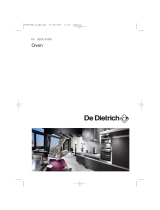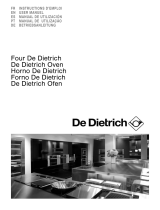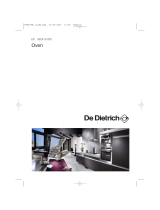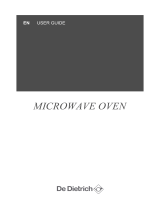
1
EN

2
Dear Customer,
You have purchased a
DDEE DDIIEETTRRIICCHH
oven and we would like to say thank you.
Our research teams have designed a new generation of appliances for you, which,
thanks to their quality, esthetics and technological advances have resulted in
exceptional products, a testament to our know-how.
Your new
DDEE DDIIEETTRRIICCHH
oven will fit in harmoniously in your kitchen, combining top
cooking performance with ease of use. Our wish is to offer you a product of
excellence.
In the
DDEE DDIIEETTRRIICCHH
line of products, you will also find a wide range of cookers, hobs,
ventilation hoods, dishwashers, built-in refrigerators, which can be coordinated with
your new
DDEE DDIIEETTRRIICCHH
oven.
Of course, in an ongoing effort to better satisfy your demands with regard to our
products, our after-sales service department is at your disposal and ready to listen in
order to respond to all of your questions and suggestions (contact information at the
end of this booklet).
You can also log on to our web site:
wwwwww..ddeeddiieettrriicchh--eelleeccttrroommeennaaggeerr..ccoomm
where you will find our latest innovations as well
as useful and additional information.
DDEE DDIIEETTRRIICCHH
SSeettttiinngg NNeeww VVaalluueess
As part of our commitment to constantly improving our products, we reserve the right to make
changes to them based on advances to their technical, functional and/or aesthetic properties.
Attention:
Before installing and using your appliance, please read this Installation and Usage Guide
carefully, which will allow you to quickly familiarize yourself with its operation.

3
TABLE OF CONTENTS
EN
1 / INFORMATION FOR THE USER
••
Safety instructions
_________________________________________
4
••
Care for the environment
____________________________________
5
2 / INSTALLING YOUR APPLIANCE
••
Choice of location
__________________________________________
6
••
Fitting
____________________________________________________
6
••
Electric connection
_________________________________________
7
3 / DESCRIPTION OF YOUR APPLIANCE
••
Introduction to your oven
____________________________________
9
••
Accessories
_______________________________________________
10
••
Introduction to the programmer ______________________________ 11
••
Introduction to the selecting touch controls ____________________ 11
4 / USING YOUR APPLIANCE
••
Using the programmer
º
How to set the time_____________________________________ 12
••
Micro-wave cooking ________________________________________ 13
••
Automatic micro-wave defrosting _____________________________ 14
••
Defrosting guide ___________________________________________ 15
••
Combined cooking ________________________________________ 16
••
Traditional cooking _________________________________________ 17
••
Programmed cooking_______________________________________ 18
••
Delayed cooking ___________________________________________ 19
••
Customising cooking temperature and power
º
Traditional cooking _____________________________________ 20
º
Micro-wave cooking ____________________________________ 20
º
Combined cooking _____________________________________ 21
••
Using the timer function_____________________________________ 22
••
Locking the controls (child safety) ____________________________ 22
••
Display stand-by mode ______________________________________ 23
5 / OVEN COOKING MODES_______________________________________ 24
6 / CARING FOR AND CLEANING YOUR APPLIANCE
••
Cleaning the outer surfaces
__________________________________
26
7 / TROUBLESHOOTING __________________________________________ 27
8 / AFTER-SALES SERVICE
••
Repairs
___________________________________________________
28

4
1 / INFORMATION FOR THE USER
EN
••
Warning
Keep this user guide with your appliance. If
the appliance is ever sold or transferred to
another person, ensure that the new owner
receives the user guide. Please become
familiar with these recommendations
before installing and using your oven. They
were written for your safety and the safety
of others.
SAFETY INSTRUCTIONS
• Your appliance is designed for standard
household use for cooking, reheating and
defrosting foods. The manufacturer declines
any responsibility in the case of inappropriate
use.
• Before each use, ensure that any
receptacles and accessories are suitable for
use in your micro-wave oven (for example:
pyrex, porcelain, etc.)
• To avoid damaging your appliance, never
operate it while empty or without the
turntable.
• Do not interfere with the orifices on the
lock on the front of the appliance; this could
cause damage to your appliance that would
require a service call.
• Check the oven regularly when cooking or
heating food in disposable containers made
from plastic, paper or other flammable
materials to avoid the risk of inflammation.
• It is not recommended to use metallic
cookware, forks, spoons, knives or metal
staples or fasteners for defrosting bags.
However, occasionally you can defrost food
packaged in low-rise aluminium containers
(maximum 4cm) without the lid. However, the
reheating time will be slightly longer. In this
case, make sure that the container is placed
in the centre of the base of the oven; it must
never be placed less than 1 cm away the
metallic walls or the door of the appliance.
• When in use, the appliance becomes hot.
Be careful not to touch the heating elements
located inside the oven. It is advisable to keep
small children away from the oven.
• For children, always:
- heat bottles without the teat, shake
the liquid and check its temperature on the
back on your hand before feeding the child.
- mix and check the temperature of
children’s food before eating in order to avoid
serious internal burns.
• It is recommended to cover food in most
cases; it will have more flavour and your
appliance will remain cleaner for longer.
However, before cooking or reheating liquids
in a bottle or sealed container, you must
remove the cap or lid to avoid the risk of
explosion.
• Never heat or cook eggs in the microwave
in their shells, on a dish or on a plate. They are
liable to explode even after the cooking has
finished and risk causing serious burns
and/or irreparable damage to your microwave
oven.
• Heating beverages in the micro-wave oven
can cause sudden and/or delayed splattering
of boiling liquid, so precautions must be taken
when handling their containers.
• In the case of small quantities (a sausage,
croissant, etc.) place a glass of water next to
the food.
• Excessive cooking times may dry out
foods and burn them. To avoid such
incidents, never use the same times
recommended for cooking in a traditional
oven.
• If you notice the appearance of smoke,
leave the door of the appliance shut, turn off
the power or disconnect the oven from the
power supply.
• This appliance is not intended for use by
persons (including children) with impaired
physical, sensory or mental capacities, or by
inexperienced or untrained persons, except if
they have been instructed in its operation by a
person responsible for their safety.

5
1 / INFORMATION FOR THE USER
EN
CARE FOR THE ENVIRONMENT
••
— This appliance’s packing materials are recyclable. Recycle them and play a role in protecting
the environment by depositing them in municipal containers provided for this
purpose.
— Your appliance also contains many recyclable materials. It is therefore marked with
this logo to indicate that used appliances must not be mixed with other waste.
Recycling of the appliances organised by your manufacturer will thus be undertaken
in optimum conditions, in accordance with European directive EC/2002/96 relating to
electrical and electronic equipment waste. Consult your city hall or your retailer to
find the drop-off points for used appliances that is nearest to your home.
— We thank you for your help in protecting the environment.
Warning
Installation should only be performed by installers and qualified technicians.
This appliance complies with the following European directives:
- Low Voltage Directive EEC/73/23 modified by directive EEC/93/68 for insertion of
EC marking.
- Electromagnetic Compatibility Directive 89/336/EEC modified by directive 93/68/EEC for
insertion of EC marking.
- EC regulation no. 1935/2004 concerning materials and objects intended for contact with
food substances.
• Never use steam or high-pressure devices to clean the oven (requirement imposed by
electrical safety concerns).
• Do not modify or attempt to modify any of the characteristics of this appliance. This would be
dangerous to your safety.
• During cooking, ensure that the door of your oven is completely closed so that the seal can
do its job properly.
• When placing dishes inside or removing them from the oven, do not place your hands close
to the upper heating elements, use heat-protective kitchen gloves.

6
2 / INSTALLING YOUR APPLIANCE
EN
FITTING
To do this:
1) Remove the rubber screw covers to
access the mounting holes.
2) Drill a Ø 2 mm hole in the cabinet panel to
avoid splitting the wood.
3) Attach the oven with the two screws.
4) Replace the rubber screw covers (they
also serve to absorb the shock caused by
closing the oven door).
(*) if the cabinet is open, its opening must be
70 mm (maximum).
Tip
To be certain that you have properly
installed your appliance, do not hesitate to
seek advice from a household appliance
specialist.
••
CHOICE OF LOCATION
The diagrams above determine the
dimensions of a cabinet that will be able to
hold your oven.
The oven can be installed under a work top or
in a column of cabinetry (open* or closed)
having the appropriate dimensions for built-in
installation (see adjacent diagram).
Your oven has optimised air circulation that
allows it to achieve remarkable cooking and
cleaning results if the following guidelines are
followed:
• Centre the oven in the cabinet so as to
guarantee a minimum distance of 5 mm
between the appliance and the neighbouring
cabinet.
• The material or coating of the cabinet must
be heat-resistant.
• For increased stability, fix the oven in the
cabinet by means of 2 screws through the
holes designed for this purpose on the lateral
mounts (fig.1).
••
560
595
540
22
376
380
560-580
20
50
10
50
550
mini
560-580
550 mini
400
310
390

7
2 / INSTALLING YOUR APPLIANCE
EN
••
ELECTRIC CONNECTION
Monophase 20A Counter
220-240V
~
50Hz
Electrical outlet
2 prong receptacle +
eeaarrtthh
CEI Standard 60083
Monophase line 220-240 V
~
Power
supply cable
length 1.50 m approx.
16A fuse or differential
circuit breaker
Electrical safety must be provided by a
correct build-in. During fitting and
maintenance operations, the appliance must
be unplugged from the electrical grid; fuses
must be switched off or removed.
The electrical connection should be
performed before the appliance is installed in
the cabinet.
Ensure that:
- the electrical installation has sufficient
voltage,
- the electrical wires are in good condition
- the diameter of the wires complies with the
installation requirements.
Your oven must be connected with a
(standardised) power cable with
3 conductors of 1.5mm2 (1 live + 1 neutral +
earth) which must be connected to a
220-240V
~
single-phase grid via the
intermediary of a 1 live + 1 neutral + earth CEI
60083 standardised power socket or via an
all-pole cut-off device or in compliance with
the installation rules.
Warning
The safety wire (green-yellow) is
connected to the appliance’s terminal
and must be connected to the ground lead
of the electrical set-up.
In the case of connection to an electric wall
socket, it must remain accessible after
installation.
The fuse in your set-up must be 10 amperes.
If the power cable is damaged, it must be
replaced by the manufacturer, its After-
Sales Service Department or a similarly
qualified person to avoid danger.

8
2 / INSTALLING YOUR APPLIANCE
EN
Warning
We cannot be held responsible for any accident or incident resulting from non-existent,
defective or incorrect earthing.
If the electrical installation in your residence requires any changes in order to hook up your
appliance, call upon a professional electrician.
If the oven malfunctions in any way, unplug the appliance or remove the fuse corresponding
to the sector where the oven is hooked up.

9
3 / DESCRIPTION OF YOUR APPLIANCE EN
INTRODUCTION TO YOUR OVEN
••
A
B
Controls
Programmer
C
D
Lamp
Wire shelf supports
D
C
B
A
•Accessories
Your appliance is equipped with a flat grid and a glass dish.

Please note:
At the end of cooking, do not touch the
dishes with bare hands.
Please note:
In order to keep your oven clean for all
cooking functions, you can place the dish
on the base of the oven.
Please note:
Take care to place the drip tray in the
centre of the side grills to avoid modifying
the circulation of air.
10
3 / DESCRIPTION OF YOUR APPLIANCE
EN
ACCESSORIES
••
fig.1
fig.2
fig.3
•Grid (fig.1):
Allows you to toast, brown or grill. The grid
should not under any circumstances be used
with other metal cookware on the micro-wave,
grill + micro-wave or circulating heat + micro-
wave settings.
However, you can reheat food in an aluminium
tray if you insulate it from the grid using a
plate.
•Glass drip tray (fig.2):
It can also be used half-full of water for
double-boiler cooking methods using the
circulating heat function. It can be used as a
cooking dish.
•Grid + glass drip tray (fig.3):
To roast and retain the cooking juices, place
the grill on the drip tray.

11
3 / DESCRIPTION OF YOUR APPLIANCE
EN
••
INTRODUCTION TO THE PROGRAMMER
A
C
D
E
I
H
J
F
B
G
K
A
B
Cooking modes display
Oven temperature display.
Cooking time indicator
Temperature rise indicator
Clock or timer display
Timer indicator
C
D
E
F
G
H
I
J
K
INTRODUCTION TO THE SELECTING TOUCH CONTROLS
••
A
B
C
D
E
F
E
B
Start/Stop
Cooking mode selection
Cooking temperature and
micro-wave power
Touch controls
Cooking time
End of cooking
Timer
Locking
F
G
H
A
C
D
G
H
Cooking end time display
Cooking end time indicator
Cooking time indicator
Control panel lock indicator
(child safety device)
Cooking time display

12
4 / USING YOUR APPLIANCE
EN
•
How to set the time
--
When supplied with electricity
The display flashes at 12:00 (fig.1)
Set the time by pressing the + or - touch
controls (holding your finger on the touch
control allows you to scroll through the
numbers rapidly).
Example: 12:30
Press the
SSTTAARRTT
touch control to validate.
The time display no longer flashes (fig.2).
fig.1
fig.2
fig.2
fig.1
- To reset the time on the clock
Press and hold the touch control for a few
seconds until the display is flashing (fig.1),
then release.
Audible beeps indicate that it is now possible
to set the time.
Adjust the clock setting with the + and -
touch controls (fig.2).
Press the
SSTTAARRTT
touch control to validate.

13
4 / USING YOUR APPLIANCE
EN
• Micro-wave cooking
YOUR OVEN HAS 6 MICRO-WAVE
COOKING FUNCTIONS
fig.2
Warning
Never turn on the oven in any mode when
empty.
Please note:
The function does not need power
adjustment.
fig.1
fig.3
Press once on the START touch control to
select the function (fig.1).
Press the START button a second time to
access the cooking time settings (fig.2):
- 0.00 flashes
- Adjust by pressing the + or – buttons.
Example: 30 seconds
Adjusting the power level:
- Press the button, “1000 w” begins
flashing (fig.3).
- Adjust by pressing the + or - buttons.
Example: 800W
- Make sure that the door is firmly closed.
Confirm your selection by pressing START.
Your oven starts by counting down second by
second.
If necessary, cooking can be stopped by
pressing on START/STOP for 1 second.
OPENING THE DOOR DURING COOKING
When the door is opened during cooking, the
oven stops operating.
When the door is closed again, cooking can
be recommenced by pressing START/STOP.

14
4 / USING YOUR APPLIANCE
EN
With your new micro-wave, say goodbye to hours of waiting for your food to defrost! The micro-
wave is the freezer’s best ally, making it possible to defrost food up to 10 times quicker than at
room temperature.
Tip:
Defrosting time depends on the type of appliance. It also depends on the shape, size, initial
temperature and quality of the food.
Be sure to remove the metallic tie from the defrosting bag when defrosting food directly in
the bag.
If there are any ice crystals on the food, remove them with a knife, otherwise the ice will act
as a screen and the food will take longer to defrost.
Defrost meat and fish by placing it on an upside-down saucer on a plate; this will allow any
juices to drain away which otherwise would cause the food to begin to cook if left in contact
with it.
In order to obtain even defrosting, as soon as possible separate poultry breasts or fish
fillets and break apart cubes of meat.
Turn over or stir food half-way through defrosting.
Leave the food to stand after defrosting. General guidelines: resting time = defrosting time.
Never refreeze food unless it has been cooked.
• AUTOMATIC MICRO-WAVE DEFROSTING

15
4 / USING YOUR APPLIANCE
EN
DDeeffrroossttiinngg
bbrreeaadd aanndd
ppaassttrryy
DDeeffrroossttiinngg
ccrruussttaacceeaannss
DDeeffrroossttiinngg
FFiisshh
DDeeffrroossttiinngg
MMeeaatt
DDeeffrroossttiinngg
FFrruuiittss
ppllaaccee tthhee
ggllaassss ddiisshh
oonn tthhee bbaassee
ppllaaccee tthhee
ggllaassss ddiisshh
oonn tthhee bbaassee
ppllaaccee tthhee
ggllaassss ddiisshh
oonn tthhee bbaassee
ppllaaccee tthhee
ggllaassss ddiisshh
oonn tthhee bbaassee
ppllaaccee tthhee
ggllaassss ddiisshh
oonn tthhee bbaassee
Food Quantity Time
French bread
Loaf of bread
Flaky or short crust
100g
200g
400g
300g
45 to 55 sec.
1 to 1 min. 30 secs
2 to 2 min. 30 secs
1 minutes
Food Quantity Time
Scallops
Shelled prawns
Whole pink shrimp
Prawns (10)
Langoustines
500g
100g
200g
500g
1,000g
5 minutes
1 min 30 secs to 2 min
5 to 7 min.
11 to 13 min.
10 to 11 min.
Food Quantity Time
Cod or haddock fillets
Atlantic cod, hake
Sole, plaice (2)
Slices of hake
Pollock, salmon
Trout (3)
400g
500g
300g
1 piece
4 pieces
540g
3 to 4 min.
3 to 4 min.
2 to 2 min. 30 secs
1 min 30 secs to 2 min
4 to 5 min.
4 to 5 min.
Food Quantity Time
Cockerel, pigeon
Chicken breast (2)
Chicken legs (4)
Whole chicken
Veal ribs
Roast beef
Beefburgers (4)
Cubes of meat
500g to 600g
200g
1,000g
1,000g
600g
1,000g
360g
600g
5 to 7 min.
3 to 4 min.
7 to 9 min...........
11 to 13 min.
5 minutes
10 minutes
3 to 4 min.
6 to 7 min.
Food Quantity Time
Strawberries
Raspberries/cherries
Gooseberries,
blueberries, black
currants
250g
250g
250g
2 to 3 min.
2 to 3 min.
2 min 3 secs to 4 min
Turn midway through
• DEFROSTING GUIDE

16
4 / USING YOUR APPLIANCE
EN
•Combined cooking
YYOOUURR OOVVEENN CCOOMMBBIINNEESS BBOOTTHH
TTRRAADDIITTIIOONNAALL CCOOOOKKIINNGG AANNDD MMIICCRROO--
WWAAVVEE CCOOOOKKIINNGG FFUUNNCCTTIIOONNSS
fig.2
Warning
Never turn on the oven when empty in
either mode.
fig.1
fig.3
Press once on the START touch control to
select the function (fig.1).
Time setting:
- Press the START button a second time to
access the cooking time settings (fig.2):
- 0.00 flashes
- Adjust by pressing the + or – buttons.
Example: 30 seconds
Adjusting the power level:
- Press the button, “300 w” is displayed, it
is the maximum temperature (fig.3).
- Adjust by pressing the - button.
Example: 100 W
- Make sure that the door is firmly closed.
Confirm your selection by pressing START.
Your oven starts by counting down second by
second.
You can readjust cooking time, power,
temperature at any time during cooking.
If necessary, cooking can be stopped by
pressing on START/STOP for 1 second.
OPENING THE DOOR DURING COOKING
When the door is opened during cooking, the
oven stops operating.
When the door is closed again, cooking can
be recommenced by pressing START/STOP.

17
4 / USING YOUR APPLIANCE
EN
•Traditional cooking
SSEETTTTIINNGGSS::
IInn tthhiiss ccooookkiinngg mmooddee tthhee rreessiissttoorrss aarree tthhee
oonnllyy ssoouurrccee ooff eenneerrggyy..
fig.2
fig.1
Choose the cooking mode:
Press once on the START touch control to
select the function (fig.1).
Pressing and holding down the START button
will allow you to scroll down to select the
desired cooking function.
The temperature is displayed:
Example: 200°C.
Press the START touch control to start
cooking.
Your oven recommends the most commonly
used temperature. It is, however, possible to
adjust the temperature:
Changing the temperature:
- Press the button (fig.2).
The °C symbol flashes.
- Adjust by pressing the + or - buttons.
Confirm your selection by pressing START.
During cooking the chosen temperature value
flashes: when it has been reached, your oven
emits a 3-second beep and the temperature
indicator stops flashing.
If necessary, cooking can be stopped by
pressing on START/STOP for 1 second.
Special case:
Variable grill:
- Suggested power setting: Turbo grill- = 66%
- Adjust from -1 = 50% to - 4 - = 100%
- End the cooking programme by pressing the
START/STOP touch control for one second.
There is no need to set a cooking time when
using the traditional mode.

18
4 / USING YOUR APPLIANCE
EN
PROGRAMMED COOKING
••
Set the desired cooking mode and adjust the
temperature if necessary
Example: Circulating heat position .
temperature 200°C then press the START
button (fig.1).
- Press the “cooking time” button.
The cooking time flashes 0:00 to indicate that
it is now possible to set it (fig.2).
- Press the + or - touch controls to set the
desired time.
Example: 25 minutes of cooking (fig.3).
The adjusted cooking time is automatically
recorded after a few seconds. It can also be
entered by pressing on the touch control
again. Then the time reappears in the display.
After these steps, the oven heats up. At the
end of cooking, a series of beeps is emitted
for a few minutes. You can stop the beeps by
pressing START/STOP for one second. You
can view or change the end of cooking by
pressing the touch control. To cancel your
programme, press the START/STOP touch
control.
fig.2
fig.1
fig.3
•Immediate cooking with
programmed cooking time

19
4 / USING YOUR APPLIANCE
EN
•Delayed cooking with
programmed cooking end
This function is only possible for the following
functions:
- Proceed as for an immediate cooking
programme, then after entering the cooking
time,
- Press the “end of cooking” touch
control, the end of cooking time appears and
flashes, to indicate that it is now possible to
set the time.
Example: It is 12:05 (fig.1).
You programmed a cooking time of
25 minutes.
The displayed end of cooking time is 12:30.
- Adjust the end of cooking time by pressing
the + or - touch controls.
Example: End of cooking 14:00 (fig.2).
- Confirm with the “End of cooking” .
Once the cooking end time has been
programmed, the time comes back on the
display.
After these steps, the oven heating is delayed
so that cooking ends at 14:00.
When the cooking cycle is finished, a series of
beeps is emitted for several minutes You can
stop the beeps by pressing START/STOP for
one second.
fig.2
fig.1
Tip:
You can view or change the end of cooking
by pressing the touch control. To cancel
your programme, press the START/STOP
touch control.
DELAYED COOKING
••

20
4 / USING YOUR APPLIANCE
EN
CUSTOMISING COOKING TEMPERATURE AND POWER
••
•Traditional cooking
When selecting the cooking mode or during a
cooking programme, you can customise the
tteemmppeerraattuurree
for traditional cooking:
- Press the touch control (approx.
2 seconds) until the temperature digits begin
flashing (fig.1).
- Use the + and - touch controls to adjust the
temperature setting you wish to record (fig.2).
- Validate by pressing the touch control
(fig.3).
For subsequent cooking programmes, the
temperature you have just entered will be
taken into account.
This procedure for customising the cooking
temperature can be repeated as many times
as you wish.
• Micro-wave cooking
When selecting the cooking mode or during a
cooking programme, you can customise the
ppoowweerr
for micro-wave cooking:
- Press the touch control (approx.
2 seconds) until the power digits begin
flashing (fig.1).
- Use the + and - touch controls to adjust the
power setting you wish to record (fig.2).
- Validate by pressing the touch control
(fig.3).
For subsequent cooking programmes, the
power you have just entered will be taken into
account.
This procedure for customising the cooking
temperature can be repeated as many times
as you wish.
fig.2
fig.1
fig.3
fig.2
fig.1
fig.3
Page is loading ...
Page is loading ...
Page is loading ...
Page is loading ...
Page is loading ...
Page is loading ...
Page is loading ...
Page is loading ...
/








